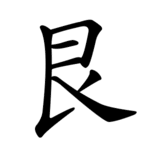Radical 138
Radical 138 or radical stopping (艮部) meaning "stopping" or "stillness" is one of the 29 Kangxi radicals (214 radicals in total) composed of 6 strokes. In Taoist Bagua cosmology, 艮 is the seventh of eight trigrams.
| 艮 | ||
|---|---|---|
| ||
| 艮 (U+826E) "stopping,stillness" | ||
| Pronunciations | ||
| Pinyin: | gèn | |
| Bopomofo: | ㄍㄣˋ | |
| Wade–Giles: | ken4 | |
| Cantonese Yale: | gan3 | |
| Jyutping: | gan3 | |
| Japanese Kana: | ゴン gon / コン kon (on'yomi) うしとら ushitora (kun'yomi) | |
| Sino-Korean: | 간 gan | |
| Names | ||
| Japanese name(s): | 艮旁/こんづくり/ごんづくり kondzukuri/gondzukuri 艮/ごん/うしとら gon/ushitora 根旁/ねづくり nedzukuri | |
| Hangul: | 괘이름 gwae ireum | |
| Stroke order animation | ||
 | ||
In the Kangxi Dictionary, there are just five characters (out of 49,030) to be found under this radical.
艮 is also the 146th indexing component in the Table of Indexing Chinese Character Components predominantly adopted by Simplified Chinese dictionaries published in mainland China.
Evolution
 Bronze script character
Bronze script character Large seal script character
Large seal script character Small seal script character
Small seal script character
Literature
- Fazzioli, Edoardo (1987). Chinese calligraphy : from pictograph to ideogram : the history of 214 essential Chinese/Japanese characters. calligraphy by Rebecca Hon Ko. New York: Abbeville Press. ISBN 0-89659-774-1.
- Lunde, Ken (Jan 5, 2009). "Appendix J: Japanese Character Sets" (PDF). CJKV Information Processing: Chinese, Japanese, Korean & Vietnamese Computing (Second ed.). Sebastopol, Calif.: O'Reilly Media. ISBN 978-0-596-51447-1.
This article is issued from Wikipedia. The text is licensed under Creative Commons - Attribution - Sharealike. Additional terms may apply for the media files.